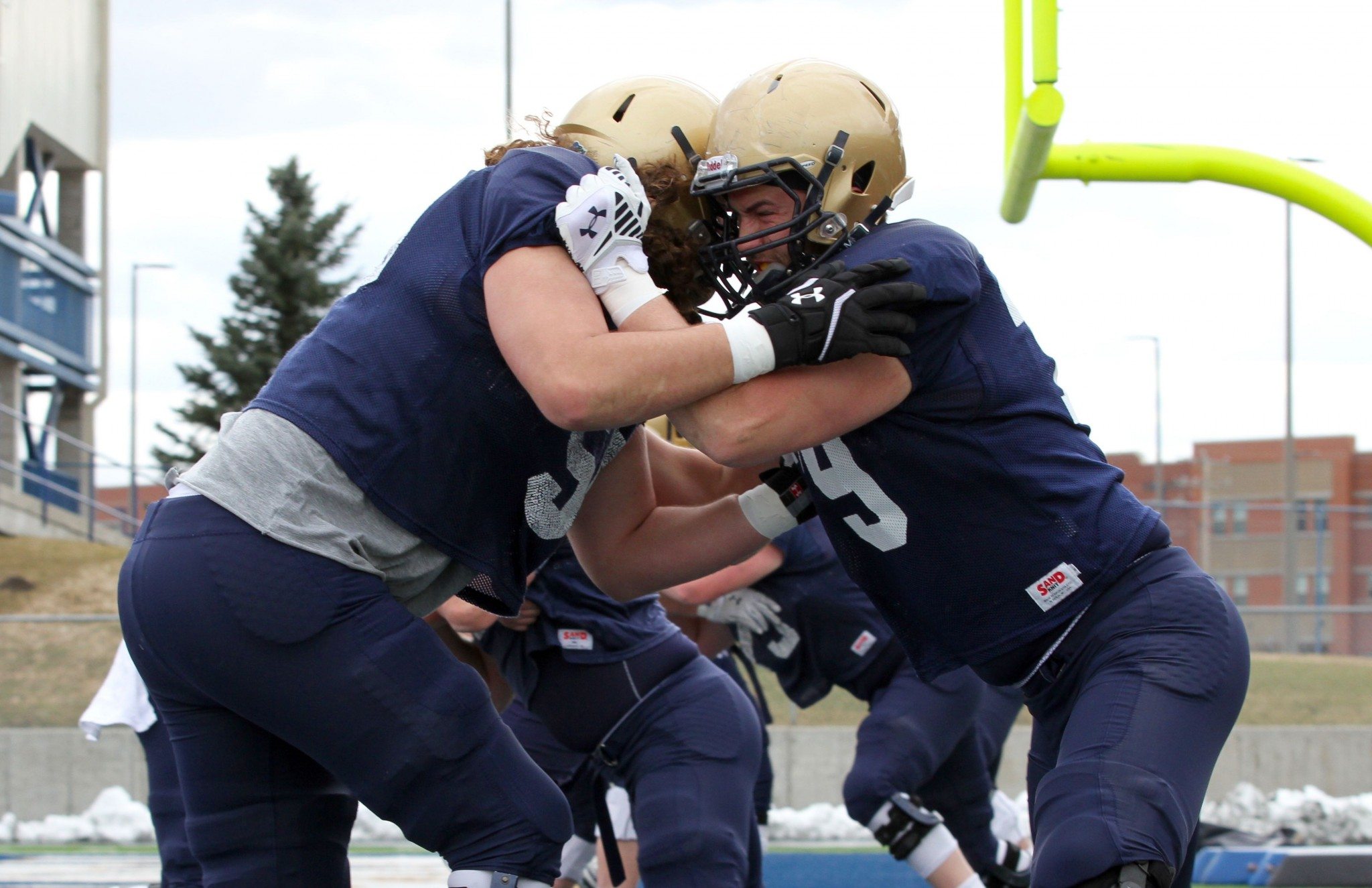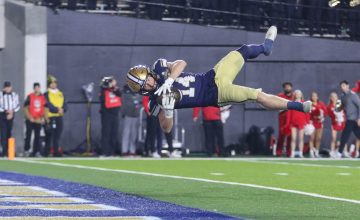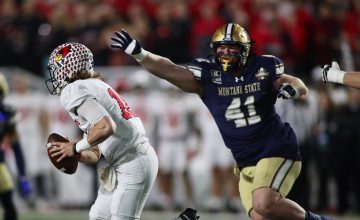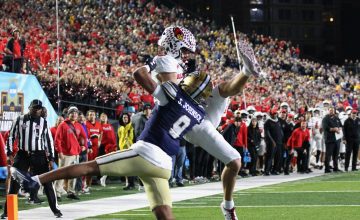Jeff Choate noticed the divisive line cutting through his new team the first day he was in Bozeman.
When Montana State’s 32nd coach was introduced the first week of December, he could tell he inherited a coachable group of young men. But he couldn’t help but notice the lack of continuity among his players.
“I noticed it immediately,” Choate said on the last day of spring football at MSU on April 18. “I noticed it the first day I walked in to be introduced. I noticed who was sitting on one side of the aisle and who was sitting on the other. It was very obvious to me there was not a lot of cross breeding. It was very cliquey. It’s always a work in progress but we have moved in a positive direction.”
Since taking over, Choate has shaken up the dynamic of the Bobcats. He rearranged the locker room. He encouraged players to hang out with teammates outside their position groups. He gave the team more freedom socially in an effort to bond. The new head coach designed a plan for the Bobcats to maintain the continuity and momentum the group built during the five-week spring session, the first under Choate as MSU tries to bounce back from the program’s first losing season since 2001.
“It’s all about below the line or above the line,” MSU defensive tackle Matt Brownlow, an affable junior who is one of the Bobcats’ most well liked players, said in an interview on the Bobcat Radio Network following the Sonny Holland spring game. “If you are not going to buy into being a part of the team, you are not going to be here. That’s a full understanding.
“We are going to have more guys here this summer. We are drafting up some activities we are going to do this summer, things in the community, cookouts, fishing, floating, lake activities. That will be more appealing to guys in general to spend the summer in Montana. There are guys who have been here for three or four years who have never been to Lake Ennis. Little things like that will help.
“In the past, we were so cliquey. It was the d-line, the linebackers, the DBs all separate. Now we have everyone mixed up. You don’t see color. You just see brothers.”

MSU running back Gunnar Brekke hits the edge with running back Chad Newell lead blocking during the Sonny Holland spring game
The difference in the way business is conducted under Choate and his staff in comparison to the last few years of the Rob Ash era was noticeable from the first day of spring drills. On more than one occasion, both Choate and defensive coordinator Ty Gregorak ripped into the team, demanding more effort and not accepting any sort of weakness, physical or mental. The energy provided by the coaching staff seemed to trickle down to most of the players and the grind of the session seemed to bring the team closer together.
“The last few years, it’s been such a routine,” MSU senior captain running back Chad Newell said. “We knew exactly what we were getting into every day at practice. You go out, you do this, this, this, team, scrimmaging. Having a little bit of chaos to it, not knowing what to expect when you get on the practice field adds a little bit of needed attention to details. The coaching staff is really harping on the details and effort is a huge priority, which is awesome.”
Newell is one of a handful of fifth-year seniors who contributed on Montana State’s last Big Sky Conference championship team in 2012. Newell said that group continues to harp on employing a relentless work ethic displayed by former team leaders like Cody Kirk, Brad Daly and Caleb Schreibeis, each core members of a group that helped MSU win three straight Big Sky titles for the first time in school history.
“We know what it takes,” Newell, a former walk-on turned All-Big Sky selection from Billings Senior High, said. “That’s what’s really going to push us and help us through is the foundation of leadership from the seniors and juniors who have played here and played a ton of snaps and understand what we are trying to do here.”
Choate and his staff conducted their 15th and final practice of spring ball the Monday after the final scrimmage. The non-padded practice was dedicated to identifying leaders in each position group who will be relied upon to conduct drills during the summer.
“We haven’t had that in the past,” MSU senior offensive guard J.P. Flynn said in early April. “It’s kind of been throw it to the wind and see how things go. But it will take the entire group to really lock in and be there every single day we can to get better.”
During the final spring practice, the coaches would show the players what they wanted out of each drill session. After handing out drill cards, the coaches stepped away and had the players coach one another.
“You could see how uncomfortable some of those guys were being in those situations,” Choate said. “That’s why I thought it was important for us to do this. There were certain areas where it will be easy. J.P. Flynn has been in coaching mode all spring (after sitting out while recovering from off-season knee surgery). For him to step in and coach those guys up, that’s seamless. For other positions, whether it’s DBs with Coach (Gerald) Alexander or linebackers with Coach (Kane) Ioane, now we are gone, here’s what we need to do. To see the guys coach each other was interesting.”
Choate, who spent more than a decade as an assistant at FBS schools like Utah State, Boise State, Washington State, Florida and Washington, has talked frequently about the difference in resources between Power 5 and Big Sky Conference football. Choate has implemented a sort of training table to help the Bobcat players with their nutrition.
At the Power 5 level, most schools have the ability to pay for most if not all of their 85 scholarship players to attend summer school. That is not a reality at the FCS level. Most of the Bobcats will work summer jobs in an effort to make extra money before the grind of the fall begins.
“The hard thing about summer workouts at an FCS school is that everyone has to work,” Flynn said. “Everyone has different work schedules. Everyone is tired at the end of the day. I know (junior offensive lineman) Caleb Gillis goes and works 12 hours of labor on a construction site because he needs the $27 an hour to live because he hasn’t been on scholarship. Does he want to come out at 7 p.m. on Thursday to go to footwork drills? No he doesn’t but that’s what we have to do to lock in and be elite. We have to push past our comfort zone, push past our limits. We have to grow as players to be the best we can be.”
Although Choate was in the FBS from 2001 until 2015, he is well aware of the challenges of small school football. He grew up in the 2,400-person Northern Idaho town of St. Maries, Idaho. He played football and started his coaching career at Montana Western in Dillon. He was a high school coach in Idaho from 1994 to 2001.
“I think that’s real life,” Choate said. “I played NAIA football. I worked 10, 12 hours a day and was still able to get in there and get my workout in. Hopefully not all our guys have to do that. Hopefully, they can work six hours a day, train two to three hours a day, get their rest. Some of them have class. You don’t want them to be a grind where they are out in the heat working 12-hour days but there’s a sacrifice you have to make for anything.
“We’ve created this culture where we are going to pay for your summer school, you are going to drink milkshakes and go work out but that’s not what this is. You have to compartmentalize your day, understand work time, school time, training time and get it done. That’s real life.”
Montana State’s players will report back to Bozeman on May 31 after a three-week break from school and training. The coaching staff cannot have direct contact with the players until they report to fall camp the first week of August. MSU strength and conditioning coach Alex Wilcox will provide all the guidance during the summer months.
The next three months will be in the hands of the players. Choate remembers his summer days in Montana as a student-athlete fondly. He hopes his players can replicate a similar experience leading up to the 2016 season.
“The thing I enjoyed about staying around in the summers more than anything was the camaraderie,” Choate said. “The coaches aren’t around to ride you so you can have freedom to do things the way you want to do. The real fun is in the hard work that leads to the tight-knit nature you have to have.
“The best part about going to school in Montana is the summer and some of these guys don’t realize that yet. Whether you are from Los Angeles, California or Dillon, Montana, you need to enjoy what is available to you. We’ve laid the foundation. We have earned their trust. Now it’s up to them.”
Photos by Brooks Nuanez. All Rights Reserved.


















